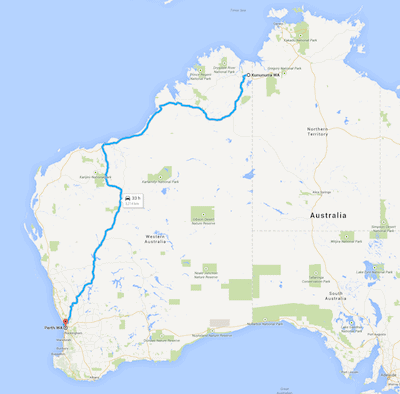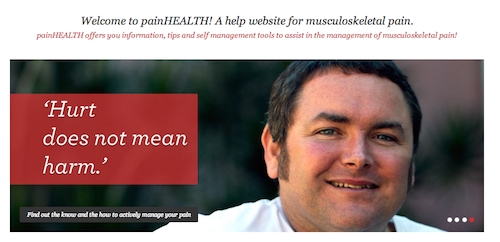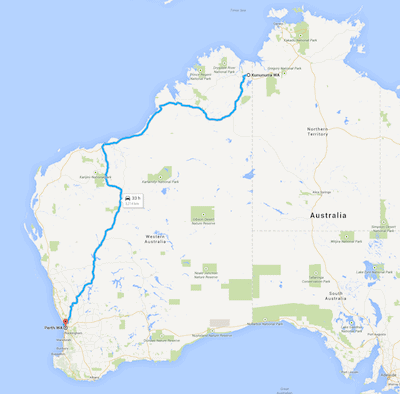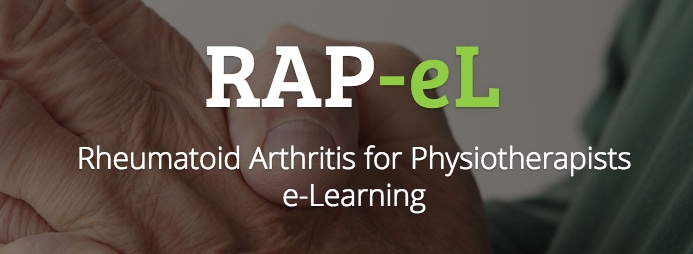Margaret River in Western Australia has some of the best surfing in the world…great food and wine too…but that’s not all. There’s a bit of digital technology wave-riding happening over west too, with 2 new initiatives recently launched and freely available not matter where you live.
- painHEALTH: aimed at helping people with persistent pain
- RAP-el: aimed at clinicians treating people with rheumatoid arthritis
These digital resources focus not just ‘knowing’ but on ‘doing’ stuff. Without the doing part, knowledge sits in a vacuum. That’s possibly one reason why the uptake of clinical guidelines into practice is so hard. You can know what to do, but how do you actually ‘do it’?
So, while some of us love a road trip, particularly if there’s surfing involved, a 32 hour straight driving if you’re coming from Kununurra to Perth for pain-related treatments, is a stretch for anyone. Yet that’s the reality for some people living in WA as we recently discovered (see here for the full article [1]).

Here are a few quotes from that research:
“There is a lady here who has to fly down to Perth every two weeks or something, it’s just not an area where that sort of thing [health infrastructure] is realistic you know”. (Male participant (KU2), Kununurra)
“Something I have always found quite difficult is getting reliable information or guidance about managing pain in a kind of holistic sense. I can go to a physio, I can go to a chiropractor, I can go to a doctor, I can take medication, and obviously I can search on the internet, but trying to work out how things come together has always been a bit of a problem” (Female participant (AL2), Albany)
painHEALTH is a response to that lack of integrated service for people living with pain and their treating clinicians.
 Jamie’s story highlights this:
Jamie’s story highlights this:
“Hi, I’m Jamie. I used to be in the Navy and then suffered this back injury. I haven’t worked since 2007. The reason I agreed to share my story [sic painHEALTH] is that so many people out there suffer and everyone feels isolated in dealing with chronic pain. I’ve gone through the highs and lows…and it’s taken a long time to get to where I am today. It has taken 12-14 months with the breathing meditation and the different steps I have taken, it has been phenomenal”.
Showing how people have improved their quality of life and managed their pain gives consumers a voice and has powerful advocacy benefits.
Since its launch in April 2013, painHEALTH has had 2,292,789 million hits from 120,308 visitors in 141 countries and the most popular pages and downloads include ‘doing’ resources such as approaching pain; moving with pain, making sense of pain and body scanning/mindfulness meditations as part of a whole person approach to care.
RAP-el was developed in response to our data showing that Australian physios aren’t confident in their disease-related ‘know’ and ‘do’ skills for treating people with RA (see here for full publication [2]). If you work in big teaching hospitals, you probably have the support systems and teams to deliver best practice care. But, the health service delivery environment is changing for people with chronic health conditions and in future, care will need to be delivered in the community, so you’ll need a skill set to meet these needs.
Check out these stories from people with RA – see how the disease has impacted them and why good quality, evidence-based and person-centred care matters so much.
Rheumatoid Arthritis for Physiotherapists e-Learning
RAP-el came off the back of a robust international Delphi project we undertook before translating relevant info into accessible, engaging ‘knowing and doing’ resource (see here [3]). The site is supported by interactive tools to help learning, using real world case studies, and clinical enablers such as red flag summaries, assessment and monitoring tools, and templates for referral letters. RAP-el was recently evaluated in a RCT – the data provided evidence for its effectiveness in improving physios’ confidence in their knowledge, skills and likely practice behaviours in managing people with RA (publication in review).
What do users think? Here’s some feedback:
“The RAP-eL program was of a high standard from beginning to end. The process was appealing from an investment of time point of view; with the program easily being able to be broken up in blocks. The resource itself was very well presented, an A+ for website design, A+ for ease of use and A+ for content. A very worthwhile experience and program. Thank you. (Luke Brennan, Physiotherapist)”
I found it very user friendly, informative and clinically relevant. It was the sort of PD that can be applied within a clinical setting very easily. I found the videos of patients useful as well to gain a clinical picture of the disease ( Catherine Saayman, Physiotherapist).
So get ‘doing’ by going surfing at painHEALTH and RAP-el. Both sites have been developed using a ‘policy-into-practice’ research design, evaluated by expert interprofessional panels and endorsed by peak professional and consumer stakeholders.
References
[1] Briggs AM, Slater H, Bunzli S, Jordan JE, Davies SJ, Smith AJ, & Quintner JL (2012). Consumers’ experiences of back pain in rural Western Australia: access to information and services, and self-management behaviours. BMC health services research, 12 PMID: 23057669
[2] Fary RE, Slater H, Chua J, & Briggs AM (2012). Translating Policy into Practice for Community-Based Management of Rheumatoid Arthritis: Targeting Professional Development Needs among Physiotherapists. International journal of rheumatology, 2012 PMID: 23209474
[3[ Briggs AM, Fary RE, Slater H, Bragge P, Chua J, Keen HI, & Chan M (2012). Disease-specific knowledge and clinical skills required by community-based physiotherapists to co-manage patients with rheumatoid arthritis. Arthritis care & research, 64 (10), 1514-26 PMID: 22556156




